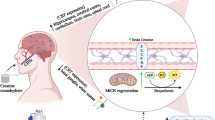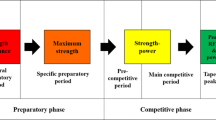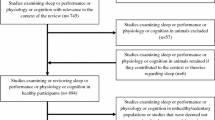Abstract
We briefly review the extant human and animal literature on the influence of fitness training on brain, cognition and performance. The animal research provides clear support for neurochemical and structural changes in brain with fitness training. The human literature suggests reliable but process specific changes in cognition with fitness training for young and old adults. We describe a research program which examines the influence of aerobic fitness training on the functional activity of the human using event-related functional magnetic resonance imaging, of humans in fitness interventions.
Similar content being viewed by others
References
Azari N., Rapport S., Salerno J., Grady C., Gonzales-Aviles A., Schapiro M., and Horwitz B. (1992) Intergenerational correlations of resting cerebral glucose metabolism in old and young women. Brain Res. 552, 279–290.
Black J. E., Isaacs K. R., Anderson B. J., Alcantara A. A., and Greenough W. T. (1990) Learning causes synaptogensis, whereas motor activity causes angiogensis in cerebellar cortex of adult rats. Proc. Natl. Acad. Sci. USA 87, 5568–5572.
Black J. E., Sirevaag A. M., and Greenough W. T. (1987) Complex experience promotes capillary formation in young rat visual cortex. Neurosci. Lett. 83, 351–355.
Blumenthal J., Emery C., Madden D., Schniebolk S., Walsh-Riddle M., George L., et al. (1991) Long-term effects of exercise on psychological functioning in older men and women. J. Gerontol. Psycholog. Sci. 46, 352–361.
Carter C., Mintun M., and Cohen J. D. (1995) Interference and facilitation effects during selective attention: an H2O15 study of Stroop performance. Neuroimage 2, 264–272.
Dustman R., Emmerson R., and Shearer D. E. (1994) Physical activity, age, and cognitive neuropsychological function. J. Aging Phys. Activity 2, 143–181.
Dustman R. E., Ruhlin, R. O., Russell R. M., Shearer D. E., Bonekat H. W., Shigeoka J. W., et al. (1984) Aerobic exercise training and improved neuropsychological function of older individuals. Neurobiol. Aging 5, 35–42.
Hawkins H. L., Kramer A. F., and Capaldi D. (1992) Aging, exercise, and attention. Psychol. Aging 7, 643–653.
Hill R. D., Storandt M., and Malley M. (1993) The impact of long-term exercise training on psychological function in older adults. J. Gerontol. Psycholog. Sci. 1, 12–17.
Kleim J. A., Lussnig E., Schwarz E. R., Comery T. A., and Greenough W. T. (1996) Synaptogenesis and Fos expression in the motor cortex of the adult rat following motor skill learning. J. Neurosci. 16, 4529–4535.
Korteling J. (1991) Effects of skill integration and perceptual competition on age-related differences in dual-task performance. Human Fact. 33, 35–44.
Kramer A. F., Hahn S., Cohen N., Banich M., McAuley E., Harrison C., et al. (1999) Aging, fitness, and neurocognitive function. Nature 400, 418–419.
Kramer A. F., Hahn S., and Gopher D. (1999) Task coordination and aging: explorations of executive control processes in the task switching paradigm. Acta Psychol. 101, 339–378.
Meiran N. (2002) Task set switching and aging. Psychology Aging. (in press)
Olincy A., Ross R., Young D., and Freedman R. (1997) Age diminishes performance on the antisaccade task. Neurobiol. Aging 8, 483–489.
Raz N. (2000) Aging of the brain and its impact on cognitive performance: integration of structural and functional findings, in Handbook of Aging and Cognition (Craik F. and Salthouse T., eds.), Erlbaum, NJ, Mahwah, pp. 1–90.
Spirduso W. W. (1975) Reaction and movement time as a function of age and physical activity level. J. Gerontol. 43, 18–23.
Spirduso W. W. and Clifford P. (1978) Replication of age and physical activity effects on reaction time movement time. J. Gerontol. 33, 23–30.
van Praag H., Kempermann G., and Gage F. H. (1999) Running increases cell proliferation and neurogenesis in the adult mouse dentate gyrus. Nature Neurosci. 2, 266–270.
Verhaeghen P., Kliegl R., and Mayr Y. (1997) Sequential and coordinative complexity in time-accuracy functions for mental arithmetic. Psychol. Aging 12, 555–564.
Author information
Authors and Affiliations
Corresponding author
Rights and permissions
About this article
Cite this article
Kramer, A.F., Colcombe, S., Erickson, K. et al. Effects of aerobic fitness training on human cortical function. J Mol Neurosci 19, 227–231 (2002). https://doi.org/10.1007/s12031-002-0038-y
Received:
Accepted:
Issue Date:
DOI: https://doi.org/10.1007/s12031-002-0038-y




